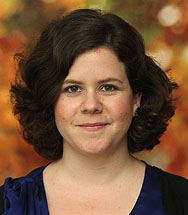"In humor, wit produces more adherence than caricature."
Inés Olza, researcher at project 'Public discourse' of the ICS, participates in the XI International seminar language and Journalism, organized by the Fundéu BBVA and the San Millán de la Cogolla Foundation and inaugurated by Queen Letizia.

"The better the humor, the less offensive it is. Wit produces more adherence than caricature". Inés Olza, researcher at project 'Public discourse' of the Institute for Culture and Society of the University of Navarra, made these statements on the occasion of her participation in the XI International seminar of language and Journalism, organized by Fundéu BBVA and the San Millán de la Cogolla Foundation and inaugurated by Queen Letizia. It takes place on May 25 and 26 at the Centro Internacional de research de la language Española (Cilengua).
From agreement with the researcher, "certain cognitive mechanisms such as creating unexpected scenarios - putting the music of a characteristic soundtrack such as Terminator in the background of a character -, unexpected situations - putting the politician as a cook, housewife... - or ruptures of expectations can be much more effective than ridiculing adjectives or insults".
Regarding the role of humor in information, topic of one of the three round tables in which the seminar was articulated, he assured that this resource can help the news to be better transmitted: "It captures our attention and automatically connects with our empathy. The public does two exercises: inferring the data goal that you want to transmit and reflecting on how it is being conveyed to us".
The limits of humor in informationRegarding the limits of humor in information, he stressed the importance of the initial pact. "If in our format this resource is applied to everything, for example, to a wide ideological spectrum, in principle the limits are wide, as long as honor is not violated or the truth is not misrepresented," he said. "The problem -he continued- comes when in genres in which there is no humor pact, such as a political talk show, humor is introduced. Then it can be understood as acceptable or not".
On the other hand, he stressed that "there are issues that by convention it is more permissible to laugh at than others" and that "human behavior fluctuates between self-censorship and the search for spaces of freedom".
In this context, he recommended "getting into the humor scene and self-parodying" to gain legitimacy: "If I only laugh at others, I lose credibility because I do not apply what I say about them". And he also recommended going from "laughing at others" to "laughing with others".
Finally, he alluded to the possibilities posed by the different journalistic genres in terms of humor. "In written journalism there is less possibility of doing something dynamic because the product is more static. The television or radio speech gives more play because it allows to rectify, add winks, use intonation, make pauses...", he pointed out.
Cartoons, humorous programs and linguistic resourcesInés Olza made these statements at the framework of the XI International seminar of language and Journalism, which is organized around three round tables: Information, with humor comes in, Humor and the creation of language and From the column to the tweet, through the vignettes. They will analyze aspects of the role of humor in information and its evolution from satirical columns to networks or memes.
Cartoons, humor programs, the linguistic resources of humor and its contribution of new words and expressions and the need to adapt languages and styles to different formats are also discussed at seminar.
Among the speakers are the humorists Antonio Fraguas Forges and Vladimir Flórez Vladdo, in charge of the inaugural lecture. Also taking part are the journalists Jorge Bustos, from El Mundo; the editor-in-chief of La Vanguardia, Magí Camps; Nieves Concostrina, collaborator of RNE and Cadena SER; Toño Fraguas, partner of Cadena SER; Jaime Rubio and Javier Sampedro, both from El País; and Juan Soto, from El Confidencial.
Also participating are the professor of language Spanish at the University of Alicante Leonor Ruiz Gurillo -who in 2014 intervened in a congress of General Linguistics at the ICS-; the professor of the Caricature Workshop of the School of Generals at the University of Costa Rica Arcadio Esquivel; the professor of essay Journalism at the European University of Madrid, Elena Gómez; and the musician and writer Julián Hernández.
They are joined by humorist Miguel Ángel López (Hematocrítico), visual artist Siro López; the executive producer of El Intermedio, Miguel Sánchez Romero; Inés Olza, researcher at Institute for Culture and Society of the University of Navarra; and humor cartoonist Jaume Capdevilla (KAP).
